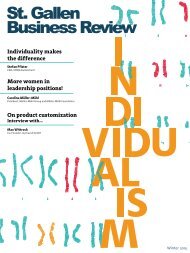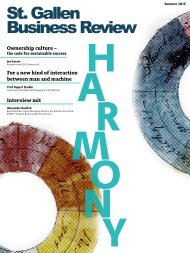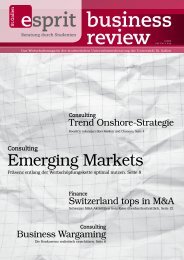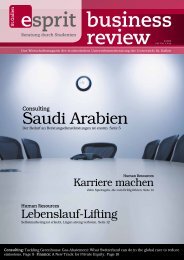Sicherheit und Risiko
St.Gallen Business Review Winter 2012
St.Gallen Business Review
Winter 2012
Erfolgreiche ePaper selbst erstellen
Machen Sie aus Ihren PDF Publikationen ein blätterbares Flipbook mit unserer einzigartigen Google optimierten e-Paper Software.
ESPRIT St.Gallen Business Review<br />
Risk and Security in a<br />
Continent of<br />
So-Called Peace<br />
Patrick Hamm<br />
Phd Fellow at the Institute of Sociology at Harvard University<br />
The European Union’s recent acquisition of<br />
the Nobel Peace Prize makes for an appropriate<br />
occasion to examine what European<br />
peace actually consists of, and whether and<br />
how this “peace” reflects fluctuating definitions of risk<br />
and security in the Western world. On October 12,<br />
2012, the Nobel Committee announced that this year‘s<br />
award will go to the European Union for its ongoing efforts<br />
to transform Europe “from a continent of war to<br />
a continent of peace.” At first glance, the Committee’s<br />
decision seems utterly baffling, since Europe appears<br />
to be everything but internally at peace: growing income<br />
inequality and threats of austerity measures<br />
provoke millions of <strong>und</strong>er- and unemployed workers<br />
to take to the streets, open and vitriolic disagreement<br />
exists between Europe’s governments and peoples,<br />
budgets continuously fail to pass, and as the viability<br />
of the Euro and the future of the Eurozone are being<br />
publicly debated, businesses flee Athens and police<br />
beat and gas protesters at the foot of the Acropolis.<br />
While it is ultimately pointless to debate the<br />
merits of this year’s award winner, it is important to<br />
note a special irony in the Nobel Committee’s choice<br />
to award the Peace Prize to the EU. Leading up to the<br />
Committee‘s decision, deadlocked European leaders,<br />
unable and unwilling to reconcile their states’ respective<br />
financial interests with those of the EU and<br />
their neighbors, engaged in bitter disputes that spilled<br />
from posh negotiating chambers to the airwaves. And<br />
within days of the official announcement of the prize,<br />
widespread protests and general strikes erupted across<br />
Europe, from London to Athens, as dispirited, frustrated,<br />
and increasingly venomous voices demanded<br />
an end to austerity, social dislocation, and the institutional<br />
structures that sustain them. Indeed, perhaps<br />
the Committee’s decision makes sense only if, like the<br />
New York Times, one views it as “a plea to support the<br />
endangered institution at a difficult hour.” In reality,<br />
the EU is at peace only insofar as its member states<br />
have not yet attacked each other with actual weapons<br />
and artillery. It is marked by discontent on three levels:<br />
between governments, between governments<br />
and their citizens, and between citizens of different<br />
European states. It is, in short, characterized by internecine<br />
strife.<br />
And yet these manifestations of economic and political<br />
risk – mass protests, social polarization, uneven<br />
economic growth, and so forth – are not temporary byproducts<br />
of the economic crisis or the post-recession<br />
economic adjustments <strong>und</strong>ertaken by European policymakers.<br />
To the contrary, these risks are hardwired<br />
into the structure of the EU – that is, the institutional<br />
architecture of the common market and common currency<br />
–, and they are amplified by the disproportionate<br />
power and influence of key economic players within it.<br />
Herein lies the true irony of the 2012 Nobel Peace Prize<br />
recognition.<br />
In selecting this year‘s recipient, the Nobel Committee<br />
chose to “focus on what it sees as the EU‘s most<br />
important result: the successful struggle for peace and<br />
reconciliation and for democracy and human rights.”<br />
The European Commission, the union’s executive<br />
governance body, on the other hand, emphasizes a<br />
different set of accomplishments centered on Europe‘s<br />
economic integration: “The Single Market is one of the<br />
EU’s main achievements. 50 years after its inception,<br />
it has not only fuelled economic growth; it has also become<br />
a part of Europeans’ everyday lives.” Indeed, the<br />
European Union was not formed with the objective of<br />
promoting peace per se but rather aimed at pacifying<br />
Europe by economic means. It is this unsteady “peace”<br />
– brokered in the form of economic competition in a<br />
common market framework – that is today responsible<br />
for the growing salience of “risk” and “security” concerns<br />
in Europe, as the phenomena <strong>und</strong>erlying their<br />
emergence are an inevitable consequence of (uneven)<br />
market competition.<br />
36<br />
Winter 2012


















